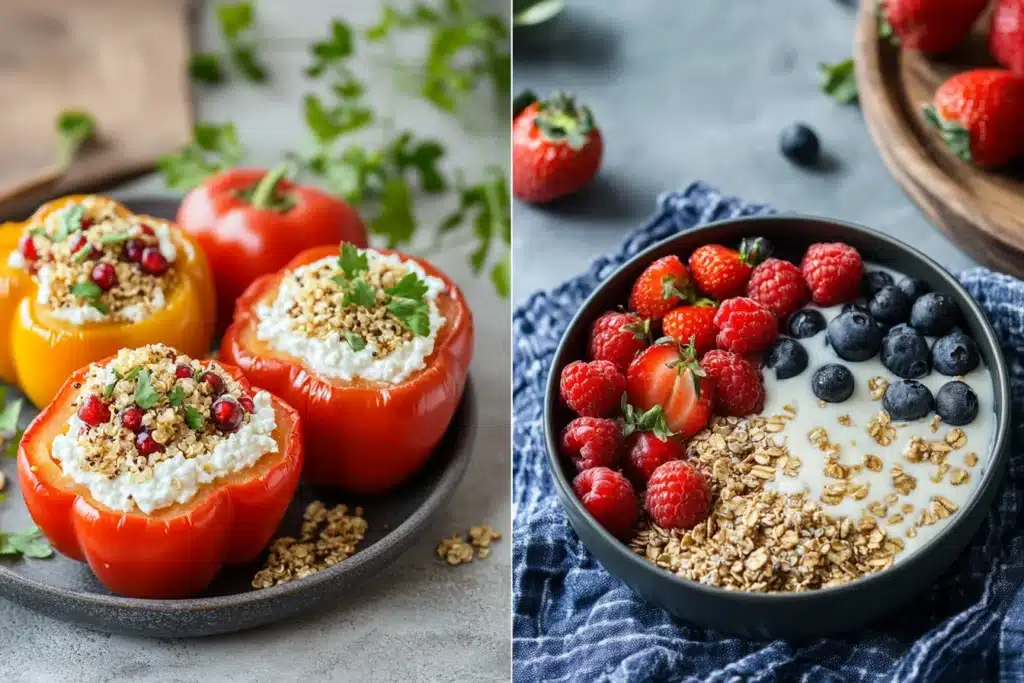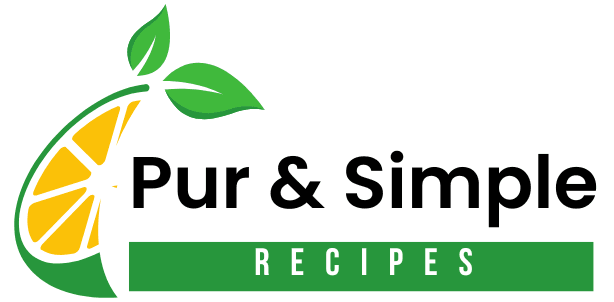Cottage cheese is loved by many for its creamy texture, mild flavor, and nutritional benefits. For years, it’s been a go-to food for health-conscious eaters, gym enthusiasts, and even home chefs looking to elevate their recipes.
But with the rise of plant-based diets and growing awareness of lactose intolerance, a new option has emerged: dairy-free cottage cheese. This alternative claims to provide the same versatility and creaminess without the dairy.
If you’re wondering how these two types compare in terms of taste, texture, health benefits, and even environmental impact, you’re not alone. In this article, you’ll discover everything you need to know about dairy-free and traditional cottage cheese. By the end, you’ll have all the information you need to decide which is the better choice for your lifestyle.
What Is Traditional Cottage Cheese?
Traditional cottage cheese is made by curdling milk and draining the whey. The result? Soft, creamy curds with a mild, tangy flavor. This classic cheese has been a kitchen favorite for centuries because of its simplicity, versatility, and nutrition.
You can enjoy it in many ways. Eat it plain for a quick snack, mix it with fresh fruits for sweetness, or use it in savory recipes like salads, dips, or casseroles. Its ability to pair with almost any ingredient makes it a go-to choice for home cooks.
Why People Love Traditional Cottage Cheese
- High in Protein: With about 13 grams per half-cup, it helps with muscle recovery and keeps you feeling full.
- Calcium-Rich: Supports stronger bones and teeth.
- Good for Digestion: Some versions include probiotics that boost gut health.
Despite its benefits, this type of cottage cheese contains lactose, which can be hard to digest for some people. It’s also not suitable for vegans since it’s made from dairy.
What Is Dairy-Free Cottage Cheese?
Dairy-free cottage cheese is a plant-based alternative designed to replicate the texture and flavor of traditional cottage cheese. Instead of milk, it’s made from ingredients like almonds, cashews, soy, or coconut. These plant-based bases are blended with water and other ingredients to create a creamy, curd-like texture.
Dairy-free cottage cheese is a great option for anyone following a vegan diet, avoiding lactose, or seeking eco-friendly alternatives. It allows you to enjoy a similar experience to traditional cottage cheese while aligning with specific dietary preferences.
The Benefits
- Lactose-Free: Perfect for people with lactose intolerance or dairy sensitivity.
- Vegan-Friendly: Completely plant-based, suitable for those avoiding animal products.
- Fortified Nutrients: Many brands fortify their dairy-free cottage cheese with calcium, vitamin B12, and vitamin D, making it nutritionally comparable to traditional options.
- Ethical and Sustainable: Using plant-based ingredients often requires fewer natural resources compared to dairy farming.
How It’s Made?
Unlike traditional cottage cheese, which relies on milk curds, dairy-free versions use plant-based bases. Here’s a quick look at how it’s typically made:
- Base Ingredients: Almonds, cashews, soy, or coconut are soaked and blended to create a creamy mixture.
- Curd Formation: Probiotics, lemon juice, or vinegar are added to create a tangy flavor and a curd-like consistency.
- Flavor Additions: Nutritional yeast, salt, and herbs may be added for taste.
Each brand uses slightly different methods and ingredients, which is why the taste and texture can vary between products.
Nutritional Comparison of Dairy-Free and Traditional Cottage Cheese
When it comes to nutrition, both types of cottage cheese have their strengths. The table below breaks down how they compare in protein, fat, calcium, and other key nutrients.
Nutritional Table
| Nutrient | Traditional Cottage Cheese | Dairy-Free Cottage Cheese |
|---|---|---|
| Protein | ~13g per ½ cup | ~5-8g per ½ cup |
| Fat | ~2-5g per ½ cup | ~4-6g per ½ cup |
| Calcium | ~10-15% DV | ~5-10% DV |
| Probiotics | Present | Often added |
| Lactose-Free? | No | Yes |
What Does This Mean for You?
- Protein Power: Traditional cottage cheese has more protein, making it ideal for anyone looking to boost their daily intake. If you’re focused on muscle recovery or staying full longer, this is a strong advantage.
- Healthy Fats: The plant-based option contains healthy fats, usually from nuts or seeds, which support heart health and provide energy.
- Calcium Content: Traditional cottage cheese is naturally rich in calcium. However, many non-dairy versions are fortified to provide similar levels, so you won’t miss out.
- Lactose-Free Advantage: If you’re lactose-intolerant, the dairy-free version is a clear winner. It’s easier to digest and gentler on your stomach.
Both options offer their own benefits. Your choice will depend on your dietary goals and lifestyle needs.
Taste and Texture: What to Expect
When choosing between these two options, taste and texture are likely top of mind. Both types have their own unique characteristics.
Traditional Cottage Cheese
- Texture: Creamy with distinct curds that are soft but firm enough to hold their shape.
- Flavor: Mildly tangy and slightly salty, with a neutral taste that pairs well with a variety of ingredients.
Dairy-Free Cottage Cheese
- Texture: The texture varies depending on the base ingredient. Almond-based versions tend to be smoother, while soy-based varieties often replicate curds more closely.
- Flavor: Dairy-free options have a mild, slightly nutty flavor that’s less tangy than traditional cottage cheese.
While traditional one remains a classic for its familiar texture and taste, many people find that dairy-free versions are close enough to satisfy their cravings.
Cooking and Recipe Versatility
Whether you choose traditional or dairy-free cottage cheese, both options can elevate your meals in creative and delicious ways. From breakfasts to savory dinners, their creamy texture and mild flavor make them easy to incorporate into any recipe.
Delicious Ways to Use Cottage Cheese
Here are a few versatile recipes that work well with both versions:
- Creamy Smoothie Bowl
Blend a scoop of traditional or plant-based cottage cheese with fresh berries, a banana, and a splash of almond milk. Top it with granola, chia seeds, or nuts for a refreshing, protein-packed breakfast. - Stuffed Bell Peppers
Fill roasted bell peppers with quinoa, spinach, and a generous scoop of non-dairy cottage cheese for a creamy vegan alternative. If you prefer, use traditional cottage cheese for extra protein and flavor. - Fluffy Catocheese Pancakes
Combine eggs, flour, and traditional cheese from the cottage to create light and fluffy pancakes. For a plant-based alternative, switch to almond flour and cottage cheese for a nutritious morning. - Tangy Salad Seasoning
Combine the cottage cheese with the oil, the juice of a limestone, and herbs that you enjoy. Use this creamy coating to drizzle over salads or roasted veggies. - Savory Pasta Soup
Combine traditional or non-dairy cheese with garlic, spinach, and a small amount of lemon juice to create a quick, creamy pasta dish. It’s a simple method of increasing the complexity of your dinner without the need for heavy cream.

Perfect for Sweet and Savory Dishes
Both types of cottage cheese are celebrated in both sweet and savory recipes. Use it in breakfast dishes, dips, pasta and desserts. If you’re preparing food for a mixed group of dietary preferences, the plant-based version provides an inclusive option for everyone at the dinner table.
To enhance your meal, try those options with
Dairy-Free Breakfast for a great and healty start.
for more about the benefits of greek product try this link Authentic Greek Breakfast
You can get more of taste with what to eat if having Sausage Recipes for BBQ
or maybe a Dino Cookie to add something special.
The options are endless. You could too Teddy Bear Cookies.
Environmental and Ethical Considerations
Choosing between dairy-free and traditional cottage cheese can also come down to environmental impact and ethical choices. Here’s how each option compares:
Dairy-Free Cottage Cheese
- Planet’s favor: Plant-based alternatives are typically less expensive in resources like water, land, and energy than dairy farming is. For instance, the production of almonds or soy has a smaller carbon impact than raising cattle.
- Cruelty-Free Opposition: Since it’s entirely derived from plants, dairy-free cottage cheese is in line with vegan and ethical diets, avoiding the suffering of animals.
Traditional Cottage Cheese
- Resource-intensive Production: Dairy farming is characterized by the utilization of water, land, and energy in significant quantities. It also has an effect on global warming, particularly in the form of methane from cows.
- Ethical Concerns: While organic and humane-certified farms take an interest in animal welfare, traditional cheese still relies on animal agriculture, which causes concerns for some consumers.
Why It Matters
Sustainability is becoming more frequently recognized as an important aspect of many people. If you want to reduce your environmental impact while still maintaining a cruelty-free diet, dairy-free alternatives may be more beneficial. Conversely, traditional cheese sourced from ethical farms can still be considered a viable option for those who value nutrition and flavor.
Cost Comparison: Which Is More Affordable?
When considered as a cost, the difference between traditional and dairy-free cottage cheese is apparent. Let’s examine the reasons in more detail.
Traditional Cottage Cheese
- More budget-friendly: Traditional cottage cheese is common in grocery stores, and its production expenses are typically less.
- budget-friendly: with less ingredients and simpler production methods, it’s typically the cheaper option, which appeals to the majority of shoppers.
Dairy-Free Cottage Cheese
- Higher Price Tag: Plant-based alternatives are typically more expensive. This is because they employ specialized ingredients like almonds, cashews, or soy, all of which are more expensive to procure and process.
- Limited Access: Despite the increasing popularity of dairy-free options, they still aren’t common in all grocery stores, which can lead to higher prices.
Why are prices evolving?
As more plant-based products become popular, the competition between brands is growing as well. This is contributing to the lower expense of dairy-free cheese cottage. Many stores now have budget-friendly options, this makes the alternative more frequented than ever before.
Which One Should You Choose?
If accessibility is of the utmost importance to you, then traditional cheese is typically the better option. However, if you’re prepared to spend a bit more money for a dairy-free or vegan alternative, the natural version may be worth the extra expense.
Frequently Asked Questions (FAQ)
Does cottage cheese come in dairy free?
Yes, many brands now offer dairy-free cottage cheese made from almonds, cashews, soy, or coconut. These options are perfect for those avoiding dairy.
Is Daisy cottage cheese dairy free?
No, Daisy’s cheese is not made from dairy. It’s derived from cow’s milk and contains lactose, which is intolerable to vegans or those who have lactose deficiency.
What can I have instead of cottage cheese?
Several substitutes for cottage cheese are available, including dairy-free versions, silk tofu, vegan yogurt, or mashed avocado that provides a creamy flavor.
Can you eat cottage cheese if you have a dairy allergy?
No, traditional cheese from cottage is made with milk and is not safe for those who have allergies to dairy. However, substitutes for dairy that are allergy-friendly are available.
What is the best cottage cheese for lactose intolerance?
Lactose-free cottage cheese is ideal for this purpose, as it retains the flavor while removing lactose. Other dairy-free options are also effective.
Is there Greek yogurt without dairy?
Yes, many brands now make Greek-style yogurt that lacks dairy. These plant-based variations are typically composed of almond, coconut or soy milk.
Which Cottage Cheese Is Right for You?
Selecting between a dairy-free and traditional cheese that is cottage is based on your dietary requirements, preferences, and values. If you’re unable to tolerate lactose, vegan, or have a environmental conscience, dairy-free options are a delicious and ethical solution. Conversely, if you focus on higher protein content and budget, traditional cheese cottage may be more appropriate.
Why don’t you try both? Experiment with each type in your preferred recipes and see which one best suits your lifestyle. Regardless, you’re adding a nutritious and versatile component to your diet.
Have you experimented with both varieties? Share your thoughts in the feedback section below! Inform us of which one you favor and your preferred recipes that contain cottage cheese, whether traditional or dairy-free.
Outbound Links:
- USDA FoodData Central for detailed nutritional information.
- Healthline for insights on plant-based nutrition.

